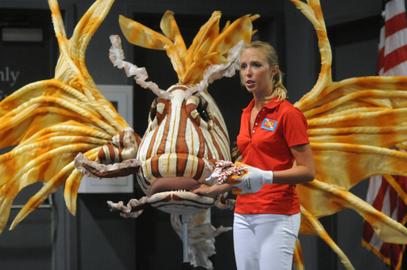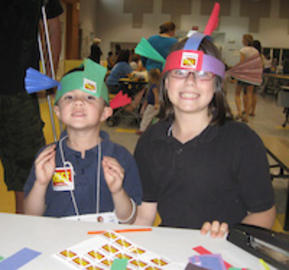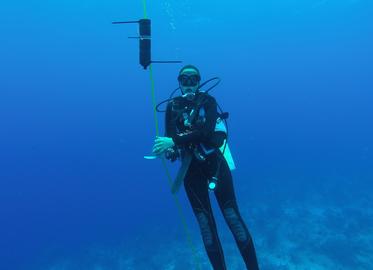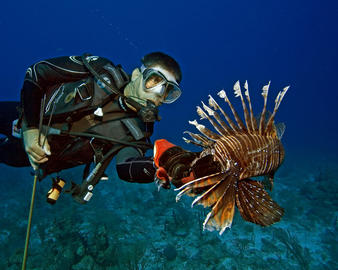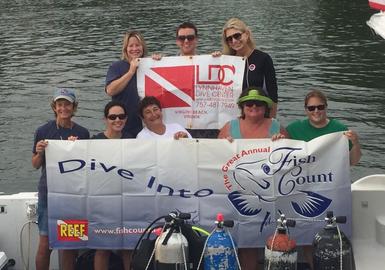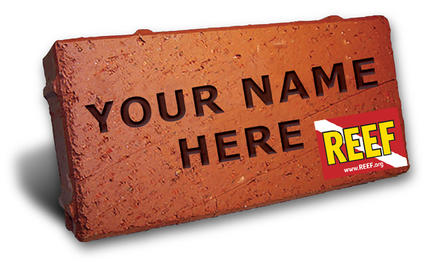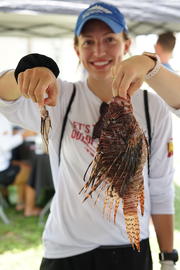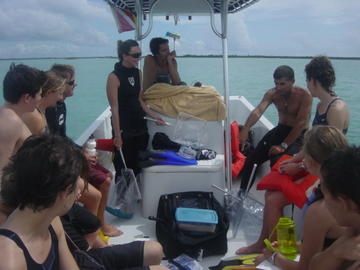Earlier this month, for World Oceans Day, the Curtis and Edith Munson Foundation celebrated by pledging to match contributions to REEF dollar for dollar, up to $30,000! Our campaign to raise funds for protecting Nassau Grouper, controlling invasive Lionfish, and inspiring citizen science through the Volunteer Fish Survey Project is off to a great start. But we still need your help to reach our goal in the next 30 days. If you haven't yet had a chance, please contribute today.
As part of our efforts to address the lionfish invasion to the western Atlantic, REEF received a grant from the US Fish and Wildlife Service Aquatic Invasive Species Program to organize and lead lionfish workshops throughout the Southeast United States. Between August and October, REEF staff Keri Kenning and Lad Akins will be traveling to more than a dozen coastal communities to present information on the lionfish invasion and hands-on demonstrations on collecting and handling.
A few weeks ago, in honor of Earth Day, REEF asked for your help in supporting our educational programs. Through classroom and field activities, these programs have inspired thousands of school children, young adults, divers, and researchers. If you haven't already made a donation, please consider making a difference in the life of a future ocean conservationist!
Contribute securely online today at www.REEF.org/contribute
Your donation will ensure that we can provide:
Acoustic tagging is one of the most powerful marine conservation technologies currently available. REEF uses this technology in both the Grouper Moon Project and the Invasive Lionfish Program to help determine movement, ranges, behavior, and more. But tags and receivers are expensive! We need your help in furthering REEF's valuable marine conservation initiatives by supporting the purchase and implementation of these valuable tools. You can donate securely online at www.REEF.org/contribute. Read on to learn more about these high-tech tools.
REEF is continuing to lead the charge on combating invasive lionfish! The 2016 Lionfish Derby Series is just around the corner and it’s going to be bigger than ever.
REEF’s 2016 Great Annual Fish Count (GAFC) brought together experienced and beginner fish watchers to count fish (and invertebrate) populations. Beginning fish ID classes were held, and then students were able to use their new skills out in the water during organized GAFC events. Participating groups and shops this year were based in several of REEF's regions, including the TWA, SAS, NE, CAL and PNW regions. The biggest GAFC events this year were held in our NE and California regions.
We are in the last few weeks of our summer fundraising campaign, and we need your help. Donations from our members are critical to REEF’s marine conservation efforts. In addition to supporting programs for marine biodiversity, fisheries management, and invasive species control, we are asking our members to make an extra donation this summer to help us build an Interpretive Center on the REEF Campus in Key Largo. Please help us continue to build our legacy of ocean conservation by being a part of this special campaign.
Purchase your VIP passes or register a team today! For complete event details, visit www.REEF.org/lionfish/derbies.
Through the analysis of acoustic recordings of captive Pterois spp., this study has confirmed anecdotal evidence that Pterois spp. are soniferous. This report of sound production in Pterois spp. provides the foundation for future research into their specific acoustic capabilities including sound production mechanisms, the role of social behaviour and applied techniques for controlling and monitoring invasive Pterois spp. in the tropical and temperate western Atlantic Ocean. REEF staff, Lad Akins, was a co-author.
Following the most recent Indo-Pacific Lionfish expedition at Stuart Cove’s in Nassau, Bahamas, we kicked off the next phase of our critical research on this invasive species in Eleuthera. Supporters, Trish and David Ferguson, served as hosts for the week. Earlier this summer, REEF staff set up 11 study sites, tagging 30 fish on six different patch reef and clearing the other 5 sites of lionfish. This past week, I revisited those tagging sites and documented any movement of lionfish.

